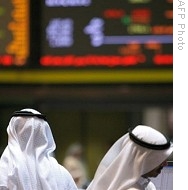VOA标准英语10月-Most Arab, Gulf Stock Markets Lower for Third Day(在线收听)
 |
| Traders follow market's movement at Stock Exchange in Kuwait City |
Most Arab stock exchanges, with several key exceptions, were lower for the third day, amid an ongoing global financial and economic crisis.
The Qatar stock market was down more than 5 percent, and Kuwait more than 2 percent lower, while Abu Dhabi, Oman and Bahrain traded marginally lower. The Dubai market was flat, while Saudi Arabia showed a 5 percent gain, after hefty losses in recent days.
Gulf economic experts say major losses by Kuwait's second-largest bank are having a ripple effect across Gulf markets. Trading in its shares remain suspended.
Meanwhile, Kuwait's Finance Minister Mustapha Shamally told Al Arabiya TV that the government has approved a draft law to guarantee bank deposits, in line with similar measures taken in the United Arab Emirates, last week.
Newspaper reports say that Kuwait is also preparing to set up a $5.6 billion fund to help beleaguered companies that have incurred large overseas losses.
United Arab Emirates Central Bank Governor Nasser al Suweidi also indicated Monday that property prices in the UAE could be facing a "correction," but that banks in the Emirates were "safe," and that the Central Bank was prepared to pour more liquidity into the banking system.
In Egypt, the Cairo stock exchange closed with a gain of 4 percent after initial losses, but investors still appear to be fearful.
A businessman in communications and information technology, Mohammed Omran, says the Egyptian market has lost more than 65 percent of its value in recent days.
"The economic crisis is not only in the Gulf, it is everywhere ... I want to talk about the stock market in Egypt, where we have seen a lot of deterioration of the market capitalization and the market value of the stock market over the last two weeks, or about 10 days since the financial crisis started hitting Egypt badly, and the market has lost over 65 percent or 70 percent of its value ...," Omran said.
Omran also believes that panic is the major factor behind the economic crisis, and that many people are converting their assets into cash.
"Well, people are saying now to themselves that cash is a king, as you know, and for that everyone of course is trying to either liquidate his own stock assets or real estate or perhaps withdraw cash from the bank and keep it safe where he can," Omran said.
While the widespread panic appears to be calming in the Arab markets, many people say they are worried the markets will continue on their slippery downward slope.